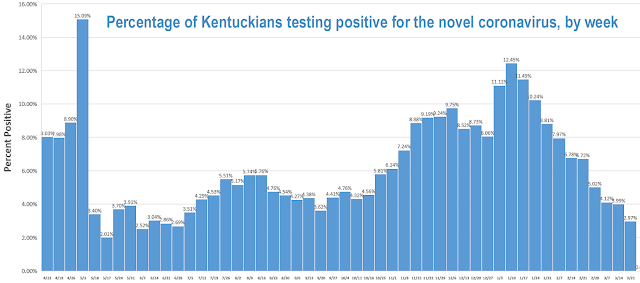Kentucky’s positive-test rate for the coronavirus falls to 2.85%

State Dept. for Public Health graph, relabeled by Ky. Health News; for a larger version, click on it.
—–
By Bruce Maples
Kentucky Health News
The percentage of Kentuckians testing positive for the novel coronavirus dropped again Wednesday, to 2.85%, as the state’s vaccination program continued to expand.
“Every day, as more Kentuckians are vaccinated, we get closer to our goal of defeating Covid-19,” Gov. Andy Beshear said in a press release. “We’re not just going to meet the president’s goal that every American adult will be able to sign up for vaccination appointments by May 1, we’re going to beat that goal by more than two weeks at least.”
The positive-test rate has generally declined since a high of 12.45% on Jan. 10, but has has had occasional upward blips and plateaus. It was 2.93% Monday and Tuesday. Beshear has cited the decline in recent relaxation of restrictions, such as increased capacity and hours in restaurants and bars.
The state reported 695 new cases of the coronavirus on Wednesday. That brought the seven-day average to 623, down 38 from the day before, when it had risen by 11, only the fourth rise in four weeks.
Kentucky’s seven-day rate of new cases also fell, to 11.58 per 100,000 residents. Counties with case rates more than double the statewide rate are Simpson, 65.4; Lyon, 55.7; Knox, 35.3; Powell, 33.5, Whitley, 31.5; Owsley, 29.1; Trimble, 27; and Jackson, 24.7. The state’s rate ranked 25th in the nation, according to the New York Times data tracker.
The state’s daily report was the first in some time on which Lyon County, site of outbreaks at state prisons, was not at the top of the list. The Corrections Department‘s daily report showed active cases in prisons fell to 193 inmates and 21 employees; two days ago, 492 inmates and 35 employees were active cases.
Counties with 10 or more new cases were Jefferson, 95; Fayette, 47; Hardin, 34; Scott, 27; Warren, 21; Boone, 20; Daviess and Kenton, 19; Laurel and Whitley, 17; Pulaski, 15; and Campbell, Christian, Hopkins, Logan, and Simpson, all with 11.
Kentucky’s hospitals reported 438 Covid-19 patients, two more than Tuesday. Of the state’s 10 hospital regions had more than 80% of their intensive-care beds in use: Lake Cumberland, at 82%.
The state added 24 more regularly reported Covid-19 deaths to its official toll, bringing it to 5,863. It also added 25 deaths reported as a result of the ongoing audit of death certificates.
The 24 fatalities were two Bell County women, 64 and 69; a Caldwell County woman, 81; a Clay County woman, 90; three Fayette County men, 62, 82, and 87; a Fulton County man, 91; a Graves County woman, 88, and a man, 39; a Hardin County woman, 94; two Johnson County women, 69 and 81, two Johnson County men, 71 and 84; a Magoffin County woman, 85; a Meade County woman, 61; two Perry County women, 84 and 92; a Pike County man, 80; a Russell County woman, 50; two Shelby County women, 69 and 85; and a Washington County man, 87.
In other pandemic news Wednesday:
- Based on daily testing of a group of health-care workers, researchers have concluded that coronavirus reinfection is possible after being fully vaccinated, but that the risk is “minuscule,” according to a letter published in the New England Journal of Medicine. Out of more than 28,000 fully vaccinated individuals, 37 tested positive, about a tenth of a percent.
- Noting the spats between Sen. Rand Paul and Dr. Anthony Fauci about the need for mask wearing after vaccination, David Catanese of McClatchy looks at what Paul gets wrong and right on this topic by talking to nine leading public health experts about the future of mask wearing in an increasingly vaccinated world. He says “Fauci’s case for masks is . . . better be safe than sorry.”
- Becker’s Hospital Review‘s analysis of the Centers for Disease Control and Prevention‘s data tracker shows that Kentucky ranks 17th in percentage of coronavirus vaccines it has administered, out of those that have been sent to the state. It shows Kentucky has administered 81.9% of its doses.
- Becker’s answers questions about post-acute Covid-19, which is sometimes called “long Covid” or “long-haul Covid-19” or “post-Covid syndrome.”